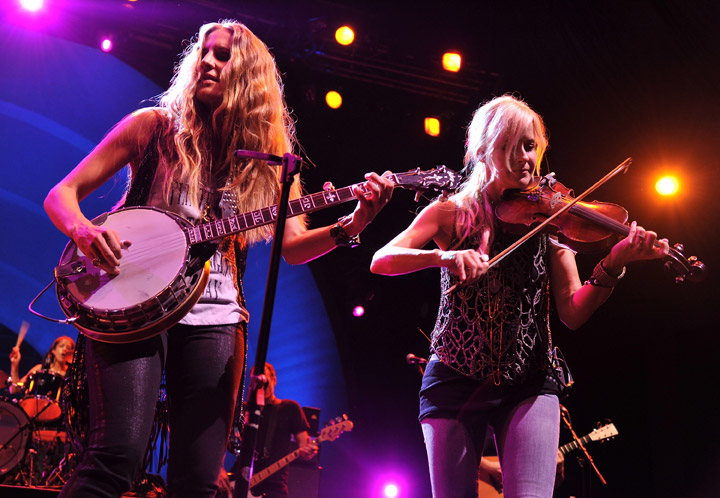TORONTO – Calling from Milwaukee, getting ready to perform with her sister as part of the Court Yard Hounds, Martie Maguire sounds totally at ease.

“I’m just trying to keep my kids awake, because they want to come up on stage with me and do some Irish dancing, so I was like, ‘Well, it’s at 10 o’clock tonight, I don’t know,'” she says.
These aren’t merely the practical musings of just any mother. From the mid-90s to the early 2000s, there were few names bigger in country music than the Dixie Chicks, composed of fiddler Maguire, her banjo-and-guitar-playing sister Emily Robison and lead singer Natalie Maines.
After controversial comments about then-U.S. President George W. Bush turned them into industry pariahs in the eyes of some, Maguire and Robison went on to form the Court Yard Hounds, who will release their sophomore album, Amelita, on Tuesday.
The group had always felt like something of a family affair, from their sister act to their songs themselves — intimate, earnest, string-driven tunes about the redemptive power of love soaked in the sensibilities of the south. With the Chicks on hiatus and Robison and Maguire helming the Court Yard Hounds, that focus is all the sharper.
Along with Robison’s country-singer husband Charlie, the group went on writing retreats in preparation for this album, and the warmth of their sororal relationship shines on the record.
“It was more of a conscious effort to write for this record,” says Maguire, 43. “(Robison’s) in San Antonio, I’m in Austin, and it’s an hour-and-a-half drive between our houses, so she’ll come up with all her kids and we’ll just have a big cousin weekend and try to get some work done.”
Songwriting is a renewed focus for Maguire. Amelita — much to her own surprise — marks the ninth album she’s made with Robison over a career spanning more than two decades. That experience has helped hone their lyric-writing and in-studio approach.
“(The Dixie Chicks) started in 1989, and Emily and I had only been in kid bands, and that set the stage for Dixie Chicks. The Dixie Chicks set the stage for this,” she says. “In the beginning, if you look at those early label albums of the Chicks, we didn’t write all that much. We had an A&R person and they were getting songs from publishers, listening to hours and hours of cassette tapes.”
What emerged on the layered Amelita is, in some ways, a return to the Dixie Chicks’ fullness of sound from their earliest bluegrass records.
“Emily and I tend to want to fill every space in the music, and it does come back to our bluegrass roots, because that’s the way that music is, where everybody fills every single hole with a little picky-picky something.”
It’s a sound that Maguire herself actually disavowed in 1992, telling the Dallas Morning News that “we have to make a living and you can’t do that playing bluegrass.”
“It sure is a hard circuit to play, really it’s hard to do any kind of music full-time. Now that we have seven kids between Emily and I … it’s been hard to figure out exactly what we want to do,” she says. “But I don’t think even if it was an easy life, I would want to go back to playing strictly bluegrass. It’s a good blending, what we’ve got right now. It just feels right.”
That’s born out of a kind of liberty provided by leaving the Dixie Chicks name behind, which has let them make the kind of music they want to make.
“It’s been nice, that when you do something new and it’s not under the constraints of the three of us, because I think we’ve gotten to a point in our career where our audience expected something specific from us, with the Dixie Chicks,” Maguire says. “We didn’t have to be answering to anything, or writing certain kinds of songs our fans are used to listening to. Creatively, it kind of opens the doors to whatever.”
The support from fans who have remained by their side despite the controversy also buoys her. In 2003, days before the U.S.-led invasion of Iraq, singer Maines told a London crowd that the Texan band was “ashamed” that Bush hailed from their state. The comment inspired boycotts, protests, corporate blacklisting, rollbacks on radio airplay and death threats. The band went on hiatus after 2006’s Taking The Long Way.
Maguire is at ease with this aspect of her history.
“It doesn’t get under my skin at all. It’s a part of who I am, it’s part of who Emily is. I think it’s always going to follow us. It’s not like we were setting out to make a political statement — we’re just a band with opinions,” she says. “It just sets us back to a time period that’s just gone and has really little to do with what we’re doing today.”
Court Yard Hounds was born out of that difficult time, though, as Maguire found herself “chomping at the bit” to get back in the studio.
“It kind of felt like therapy,” she says. “That’s your main voice to your audience, so that’s why I think we wanted to get back in the studio after that.”
Perhaps still leery of the American reception, though, the Dixie Chicks have largely eschewed U.S. tour dates, playing instead in Canada with some regularity. This summer has already featured shows in Craven, Sask., Ottawa and in Calgary. Maguire says playing as the Dixie Chicks feels as easy as slipping back in with family.
“We played a show about a month ago, and we only did five or six songs, but we barely had to rehearse,” she says, adding that they even played with a completely new band. “Everything just clicked right in.”

Comments